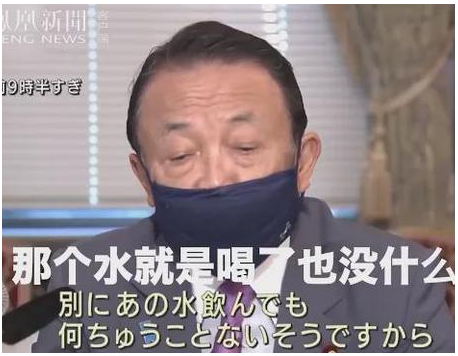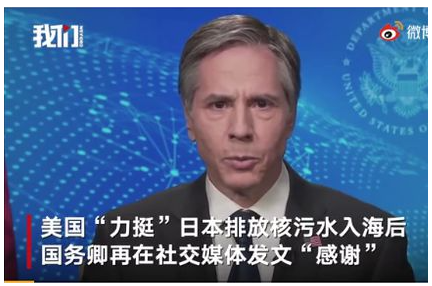日本福岛核污水将排入大海!日本首相:经稀释后能喝;网友:那你喝呗!
阅读量:
2011年,东日本大地震导致了福岛核电站发生事故。整整十年过去,福岛的重建工作不尽如人意,核电站的放射性废物处理仍然没有进展。
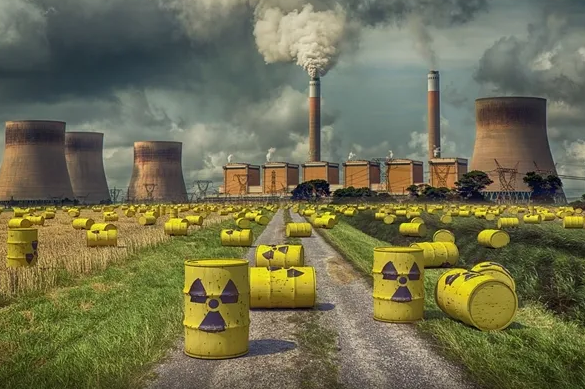
最糟糕的是,储存核废水的水槽、储存罐,也即将用尽了。日本曾探讨过五种处置方案 最后选择了“最经济”的排放入海——4月13日,日本政府召开内阁会议正式决定,福岛核电站核污水在经处理及稀释后,将排入大海。
在排放之前会用海水将处理水稀释100倍以上,使氚的浓度降到世界卫生组织(WHO)规定的饮用水水质标准的七分之一左右。但多方质疑,这些处理水仍带有放射性物质。
可以明确的是,自此,“潘多拉魔盒”将被开启。
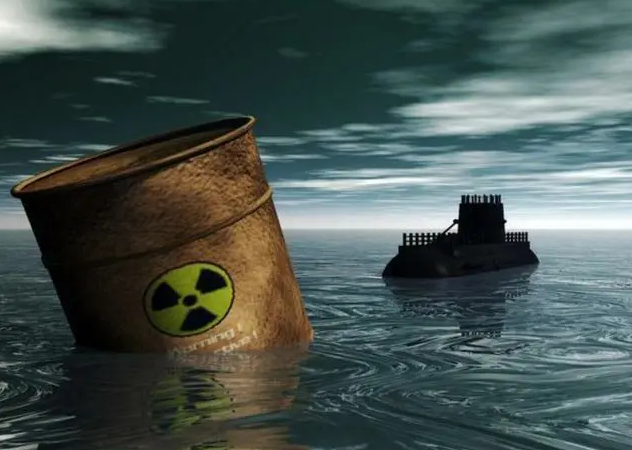
今天,我们一起跟着外媒《金融时报》的报道,来看看整件事的来龙去脉:

(注:本文选自《金融时报》网站20210415日;同学们在阅读英文的时候,可以先尝试自行锻炼翻译哦)
外刊精读 PART1 Q: 文章段落原句 Japan will release more than 1m tonnes of contaminated water from the Fukushima Daiichi nuclear power plant into the Pacific, a move condemned by environmentalists, fishermen and neighbouring countries. Tokyo Electric, the plant’s operator, will construct equipment to dilute and release the water, which has accumulated since three reactors melted down during the 2011 tsunami that overwhelmed the facility. Discharges will start in about two years, subject to final approval by nuclear regulators. Q: 段落长难句解析 ,学习contaminate /kənˈtæməneɪt/的用法。 这个词作及物动词,表示to make a place or substance dirty or harmful by putting something such as chemicals or poison in it,弄脏、污染。 例句:Drinking water supplies are believed to have been contaminated. 据信饮用水已受到污染。这里是过去分词前置作定语。 第二,学习dilute /daɪˈluːt/的用法。 作及物动词,表示to make a liquid weaker by adding water or another liquid,稀释(液体)、使(液体)变淡,同义词为water down(往液体里加水以稀释),常用搭配为dilute something with/in something。 例句:Dilute the paint with a little oil. 用少量油把颜料稀释一下。

外刊精读 PART2
Q: 文章段落原句 The decision — made after years of public consultations and wrangling by expert committees — risked reviving some of the trauma of the nuclear accident and worsening its legacy of pollution. But Japanese authorities argued that there was no practical alternative to releasing the water as storage space ran out. They add there was no risk to human health and that operating nuclear plants around the world release similar water every day. “In decommissioning Fukushima Daiichi, we cannot avoid the wastewater issue”. Q: 段落长难句解析 第三,学习wrangle的用法。 这个词作不及物动词,表示to argue with someone angrily for a long time,(长时间地)吵架、争论,其后常接介词over/about。 例句:They are still wrangling over ownership of the house. 他们仍就房子的所有权问题争吵不休。这里是动名词结构。
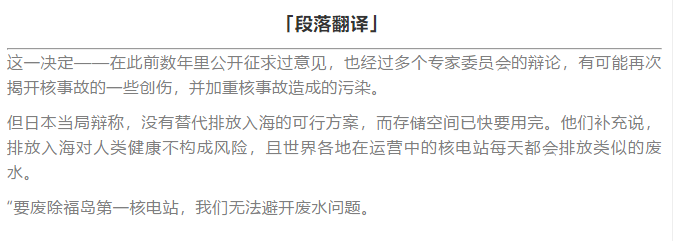
外刊精读 PART3
Q: 文章段落原句 “Therefore, based on an approach that clearly exceeds safety standards and a thorough plan to avoid reputational damage, we have judged it is pragmatic to release water to the ocean.” The Fukushima reactors melted in March 2011 after a devastating tsunami knocked out their cooling systems. Water subsequently used to cool the reactors, along with groundwater flowing into the site, became contaminated with radioactive nuclides. Q: 段落长难句解析 ,学习pragmatic /præɡˈmætɪk/的用法。 这个词作形容词,表示dealing with problems in a sensible practical way instead of strictly following a set of ideas,讲求实际的、务实的、重实效的。 例句:Williams took a more pragmatic approach to management problems. 威廉斯在管理问题上采用的是一种更务实的做法。 第二,学习knock something ↔ out的用法。 这个动词短语表示to damage something so that it does not work,摧毁、破坏。 例句:The air raids were planned to knock out communications on the ground. 计划中空袭是为了摧毁地面通信。

外刊精读 PART4
Q: 文章段落原句 The contaminated water has been treated with an elaborate filtration system to remove most of the radioactive material. However, there is no practical way to filter out tritium. Tritium has a half-life of 12.3 years, the time needed for half of the initial radioactivity to decay. Radiation can be dangerous to health but everybody is exposed to a certain amount of background radiation, with higher doses when taking a long-distance flight or receiving an X-ray. Japan’s government claims that the radiation dose from Fukushima water would be no more than 1/1,000th of the natural exposure, even if it were all released in a single year. Q: 段落长难句解析 第三,学习filter something ↔ out的用法。 这个动词短语有两个含义: ✔其一,to remove something, using a filter,(用过滤器)滤掉、滤除、 例句:The pump filters out mud. 这台泵滤掉泥浆。 ✔其二,to remove words, information etc that you do not need or want,滤除(不需要的单词、信息等)。 例句:Net users can filter out unwanted emails with software. 网络用户可以使用软件过滤掉不想收到的电子邮件。
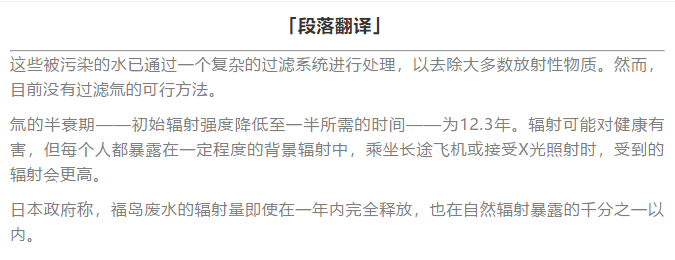
外刊精读 PART5
Q: 文章段落原句 “This decision is extremely regrettable and we do not accept it at all,” said Hiroshi Kishi, chair of the National Federation of Fisheries co-operatives. “We hereby register our strong objections.” Environmentalists said Japan had ignored the option of storing the water indefinitely and had chosen the cheapest approach of dumping it in the ocean. South Korea expressed its “strong regret” but the US cautiously endorsed Japan’s approach. “Japan has weighed the options and effects, has been transparent about its decision, and appears to have adopted an approach in accordance with globally accepted nuclear safety standards,” said the US state department. Q: 段落生词解析 ,学习register的熟词僻义。 这个词作及物动词,用于正式场合,表示to officially state your opinion about something so that everyone knows what you think or feel,正式表达、说明。 例句:The delegation registered a formal protest with US embassy officials Wednesday. 代表团在星期三向美国大使馆官员提出了正式抗议。 第二,学习weigh的用法。 这个词作及物动词,也可写作weigh up,可表示to consider something carefully so that you can make a decision about it,认真考虑、权衡(某事),常用搭配为weigh something against something。 例句:We have to weigh the benefits of the scheme against the costs. 我们必须把这个方案的好处和费用放在一起进行权衡。
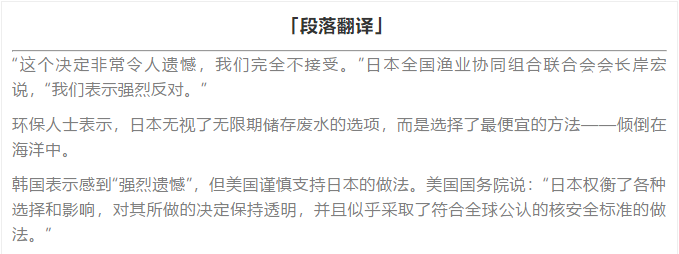
面对日本如此不负责任的行为,
各个国家又作何反应?
1 日本:废水能喝? 日本副首相兼财务大臣麻生太郎称“处理过的核废水喝了也没什么问题”。但当日本首相菅义伟前往东电考察时,工作人员递过去一杯核废水,说“经稀释后能喝”,被菅义伟拒绝。 日本网友:“没事?那你喝呗。” 日本政府:“那还是算了吧.....但它是安全能喝的!媒体们,给我宣传起来”。 2 美国:一边赞成,一边绝交? 国务卿布林肯“感谢日本在决定处理福岛核电站核污水方面作出公开透明化的努力”。 美国网友:“你居然感谢日本往海里排核废水,你们可是在这片海的沿岸。” 美国政府:“新冠疫情已自顾不暇,其他勿cue!” 3 太平洋不是下水道! 中国外交部发言人赵立坚:“海洋不是日本的垃圾桶,太平洋不是日本的下水道。日方处理核废水不应让全世界买单。” 中国网友:“以后别吹日本垃圾分类做得好了,核废水都乱倒。” 中国政府:“日方不能对国际社会的反对视而不见!” 之前,文学评论家斯库里分享了个关于福岛核事故的“小剧本”,引发了网友们的思考—— 一个日本孩子远眺福岛核电站的废墟。 问他的爷爷:“爷爷,这里以前是个核电站吗?” “是的。”爷爷叹了口气,拍了拍孩子的头。 “那,泄漏的核辐射已经都处理好了吗?” “是的。”爷爷叹了口气,拍了拍孩子的第二个头。
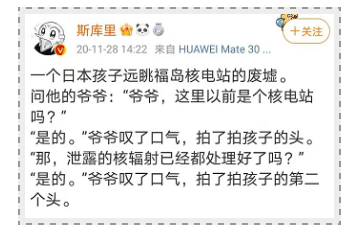
如今回过头来再看,似乎更有画面感了…....
